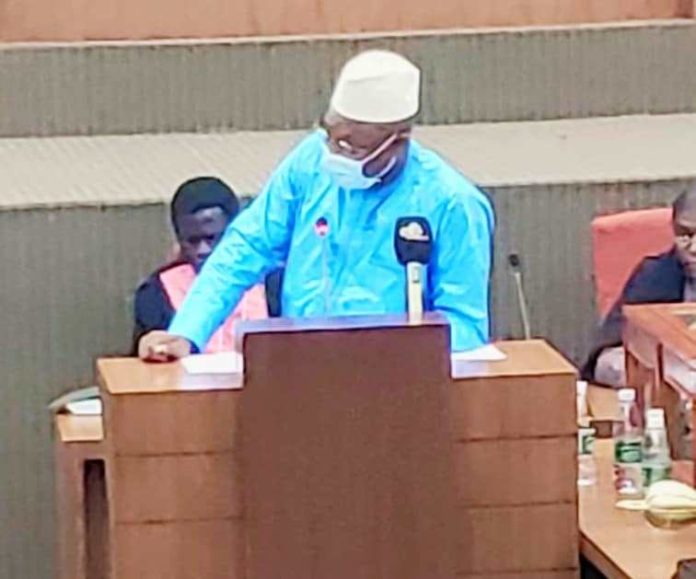By: Kebba AF Touray
The Finance Minister, Mambury Njie, has told the legislators, during the budget speech that revenue loss from tax expenditure for the first 9 months of 2020 stands at D2.4 billion (2.5 percent of GDP), compared to D1.9 billion (2.2 percent of GDP) in the same period of 2019.
This, he said, is partly as a result of the purchase of medical equipment and supplies as COVID-19-related support from the World Bank
Minister Njie said this on Thursday 28th October 2021, while delivering the budget speech at the national assembly.
“Revenue and Grants for the first nine months of 2020 increased by 16 percent from D12.3 billion (14 percent of GDP) in the first nine months of 2019 to D14.2 billion (15 Percent of GDP)”, he said.
He explained that this is largely due to an increase in indirect taxes and nontax revenue during the period.
He also said that total expenditure increased by 13 percent from D14.5 billion (16 percent of GDP) in first nine months of 2019 to D16.4 billion (17 percent of GDP) in the same period in 2020.
While other components of expenditure registered increases, Minister Njie said that capital expenditure declined by 17 percent from D5.3 billion to D4.4 billion between the two review periods. He said that this is mainly due to a decline in the disbursement of the externally financed capital expenditure in 2020.
Current expenditure he said increased by 30 percent from D9.2 billion (102 percent of tax revenue) in the first nine months of 2019, to D12 billion (116 percent of tax revenue) in the same period in 2020.
“Personnel emoluments increased marginally by 1 percent to D2.9 billion in in the first 9 months of 2020 compared to the same period in 2019. The bulk of the increase in current expenditure emanates from other charges, which recorded an increase of 60 percent from D4.1 billion in the first nine months of 2019 toD6.5 billion in the same period of 2020”, Minister explicated.
This significant increase is as a result of COVID-related expenditure (food support, stimulus package, health, etc). Interest payments also increased from D2.2 billion to D2.5 billion between the first nine months of both periods. This 13 percent increase was due to the external debt restructuring secured with external creditors.
He also stated that the overall fiscal deficit excluding grants increased by 9 percent from D5.5 billion (6.2) percent of GDP) in the first nine months of 2019 to D6 billion (6.3 percent of GDP) in the first nine months of 2020. The increase in the deficit is due to the significant increase in expenditure.
“The public debt stock as at end September 2020 stands at D67.6 billion (71 percent of GDP) compared to D71.3 billion (81 percent of GDP) in the same period in 2019. Of the total public debt stock, domestic debt constitutes D32.1 billion (34 percent of GDP), while external debt constitutes D35.5 billion (37 percent of GDP) in 2020”, averred Minister Njie.
The banking system’s Net Foreign Assets (NFA) expanded to D21.3 billion as at end September 2020 from D14.1 billion a year ago. Its components, NFA of the Central Bank and Deposit Money Banks grew significantly by 64 percent and 37.3 percent respectively.
Njie also said that the NFA of the Central Bank increased to D11.9 billion from D7.3 billion at end-September 2019 and the NFA of the Deposit Money Banks rose to D9.4 billion from D6.9 billion as at end-September 2019.
“The Net Domestic Assets (NDA) of the banking system grew by 5.4 percent from end- September 2019 to D17.3 billion as at end-September 2020, reflecting a moderate growth in domestic credit”, remarked Njie.
He highlighted that domestic credit grew by 4.3 percent to D32.1 billion, as a result of a slight increase in net claims on Government by 1.7 percent, and the continuous growth momentum in private sector credit of 13.2 percent.
“Food inflation, which is the main driver of headline inflation declined from 7.2 percent recorded in September 2019 to 6.6 percent in September 2020. The major drivers during the period were bread and cereals, meat, fish, and vegetables”, he said.
He also said that Non-food inflation decelerated significantly to 3.7 percent in September 2020 from 8.3 percent in September 2019. This is primarily due to the decrease in most subcomponents of non-food such as communication, clothing, footwear; hotels, restaurants, water, electricity and gas.






















